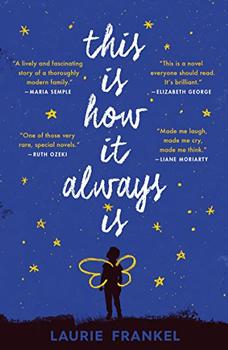Summary | Excerpt | Reading Guide | Reviews | Beyond the Book | Readalikes | Genres & Themes | Author Bio

"Does that really count?"
"My job isn't nine to five." She looked at her watch. In fact, she had to be at the hospital in just more than an hour. Night shifts were brutal but easier to schedule around. Sometimes, it was just less painful to forgo sleep than to try to find child care for all the early dismissals and vacations and holidays and staff developments and parent-teacher conference days. It was also true that nights in the ER were often more peaceful than nights at home with her family. Sometimes they even involved less blood.
"Yeah, but I mean, you're a doctor," Heather was saying.
"So?"
"So doctor's a real job."
"So is writer."
"I don't know how you do it," Heather said again, shaking her head. And then added, giggling, "Or why."
In fact, how was an easier question than why. How was the same answer as it is for all impossible things you do anyway. One day at a time. One foot in front of the other. All for one and one for all. Anyway, some cliché with the word "one" in it, ironic since it had been so long since she was just a one. She herded the boys—some of the boys—toward the car. If she was going to have to have this conversation with Heather at the bus stop every day, she might just start picking the kids up from school. Driving to and from the bus stop seemed absurd to her. Wasn't the point of the bus to bring kids from their home to the school? She loved their sprawling old farmhouse, their fifteen acres of rangy, overgrown land, going ceaselessly to seed. There was a barn that was only the memory of a barn, a stream that was mysterious and wet enough to be fun, but not deep or fast enough to worry about. The house was designed for a family of farmers, a family with lots of children who rose before dawn to help milk cows or slop livestock or whatever it was farm children did. Rosie and Penn had nothing to milk nor any animals beyond the puppy (Jupiter, a present for the twins' fourth birthday), but they did, more frequently than not, have children up before dawn. Those children needed lots of bedrooms, and the farmhouse had plenty, plus a perfect nursery off the master which smelled perpetually of talcum powder and was painted yellow, just in case the baby was a girl one of these days. The floors were not even. The walls were not soundproof. The water took a long time to be hot. But Rosie loved the rough-and-tumbleness of the house, which matched the rough-and-tumbleness of her family. Among other things, when the molding got nicked—and it did—no one cared. Some days though, plain old suburbia and a cul-de-sac at the top of which a bus stopped seemed easier. Some days, she just didn't have the energy. This day she felt tired. She didn't know why. But she needed to shake it off anyway. Her workday had not yet begun.
At home, she proceeded with the business of one foot, one day, one for all. Penn kissed the boys hello, kissed her goodbye, went off to fetch Rigel and Orion. She took over dinner prep—sautéing the vegetables Penn had chopped, seasoning the rice Penn had boiled, grilling the shrimp Penn had marinated. (She did not yet know that the racing-together Claude halves precluded any chance that avoiding red meat would beget a girl.) While the beans simmered, she emptied lunch boxes, checked folders, sorted forms. While the sauce reduced, she finished washing dishes from the night before. While she dried them, she interrupted the roller-skating contest Roo and Ben were holding in the living room three times. (It wasn't that she finally succeeded in getting them to stop. It was that she finally succeeded in not caring anymore.)
Then Roo set the table. Then Ben poured water into water glasses. Then Penn, Rigel, and Orion came back in, all three of them wet and emotional, Penn from the traffic, which he reported was a mess because of the thunderstorm, Rigel and Orion from something having to do with a sand table that Rosie couldn't make out but made sympathetic noises toward anyway. If traffic was bad, she needed to leave early for work. If she needed to leave early for work, she needed to leave now. Penn pulled the shrimp from the grill and the rice from the pot, threw both in with the vegetables in the wok, combined sauce and beans, and dumped some of all of the above into a giant to-go container, added a spoon, and shoved it into Rosie's hands as she checked to see how many of the many things she absolutely must not forget had actually made it into her bag. Some. She gave quick kisses all around and headed for the car. If traffic was as bad as Penn said, she'd be able to eat dinner on the way to the hospital.
Excerpted from This Is How It Always Is by Laurie Frankel. Copyright © 2017 by Laurie Frankel. Excerpted by permission of Flatiron Books. All rights reserved. No part of this excerpt may be reproduced or reprinted without permission in writing from the publisher.
Your guide toexceptional books
BookBrowse seeks out and recommends the best in contemporary fiction and nonfiction—books that not only engage and entertain but also deepen our understanding of ourselves and the world around us.